Table of Contents
Get started with MyPerfectResume today!
- Build a resume on any device
- Pick an ATS-friendly template
- Tailor with AI copy suggestions
Why this resume works
- Quantifies accomplishments: The applicant highlights measurable accomplishments, such as reducing project costs by 20%, showcasing their ability to drive efficiency and deliver value.
- Highlights industry-specific skills: Industry-specific skills, such as soil testing and environmental compliance, highlight the applicant’s expertise in geotechnical engineering.
- Showcases career progression: Progressing from an environmental engineer to a geotechnical engineer with increasing responsibilities reflects significant career growth, demonstrating their capability to handle complex projects and lead teams.
More Geotechnical Engineer Resume Examples
Browse more geotechnical engineer resume examples to discover how to highlight your technical skills, project experience, and analytical abilities. These civil engineering resume samples will guide you in creating a strong resume for potential employers.
Entry-Level Geotechnical Engineer
Why this resume works
- Effective use of keywords: Strategically weaving role-relevant keywords like “soil analysis” and “site inspection” improves the resume’s chances of passing applicant tracking systems (ATS) and standing out to hiring managers.
- Shows digital literacy: Mentioning tools and techniques like eco-friendly construction showcases the applicant’s digital readiness by highlighting their practical computer skills in modern engineering environments.
- Centers on academic background: The education section effectively spotlights early academic success, such as a master’s degree in geotechnical engineering.
Mid-Level Geotechnical Engineer
Why this resume works
- Points to measurable outcomes: By detailing outcomes like a 20% improvement in soil analysis accuracy, the applicant effectively illustrates their capacity for delivering measurable results and driving project success.
- Displays technical expertise: With certifications such as Professional Engineer and expertise in CAD software, the applicant showcases a solid foundation of technical skills essential for geotechnical engineering roles.
- Clear contact information: A professional resume header ensures that contact details are clear and accessible, increasing the chances of receiving prompt callbacks from potential employers.
Experienced Geotechnical Engineer
Why this resume works
- Showcases impressive accomplishments: By showcasing results like saving $2M through innovative design, the applicant effectively conveys impactful accomplishments that align with senior-level expertise.
- Focuses on work history: Using a chronological resume format, the applicant emphasizes extensive work history, detailing progressive roles from consulting engineer to geotechnical engineer over several years.
- Emphasizes leadership skills: Accomplishments like managing a team to optimize workflow by 25% reflect the applicant’s ability to apply leadership skills in high-stakes engineering environments.
Geotechnical Engineer Resume Template (Text Version)
Li Jones
Los Angeles, CA 90009
(555)555-5555
Li.Jones@example.com
Professional Summary
Geotechnical engineer with 8 years of experience in soil testing, foundation design, and project management. Proven track record of reducing costs by 20% and enhancing compliance by 15%. Expert in geotechnical analysis and environmental engineering.
Work History
Geotechnical Engineer
EarthWorks Engineering – Los Angeles, CA
June 2022 – June 2025
- Led soil investigations for 50+ projects.
- Improved foundation designs by 30%.
- Managed geotechnical reports for large-scale builds.
Soil Mechanics Specialist
GeoTech Solutions – Los Angeles, CA
June 2019 – May 2022
- Conducted soil analysis for 40+ sites.
- Reduced project costs by 20%.
- Implemented advanced soil testing techniques.
Environmental Engineer
GreenGates Engineering – Riverside, CA
June 2017 – May 2019
- Coordinated environmental impact assessments.
- Enhanced compliance by 15%.
- Supervised waste management projects.
Languages
- Spanish – Beginner (A1)
- French – Beginner (A1)
- German – Intermediate (B1)
Skills
- Soil Testing
- Foundation Design
- Geotechnical Analysis
- Project Management
- Environmental Compliance
- Risk Assessment
- Report Writing
- Site Investigations
Certifications
- Professional Engineer (PE) – Texas Board of Professional Engineers
- Geotechnical Engineering Certificate – American Society of Civil Engineers
Education
Masters in Civil Engineering Geotechnical Engineering
University of Texas at Austin Austin, TX
May 2017
Bachelor of Science Civil Engineering
Texas A&M University College Station, TX
May 2015
Related Resume Guides
Advice for Writing Your Geotechnical Engineer Resume
Explore our advice on how to write a resume for a geotechnical engineer position and discover how to highlight your engineering projects and expertise in soil mechanics. Tailor your resume to stand out in the world of geotechnical engineering with tips that speak directly to your field.
Highlight relevant technical skills
For a geotechnical engineer, technical skills are essential. These skills help you understand the ground and its behavior, which is important for building safe structures. Some technical skills that geotechnical engineers need include soil mechanics, slope stability analysis, and foundation design.
Knowing how to use software like AutoCAD or Geostudio can also be helpful. These tools let you create models and plans that engineers rely on to build things safely. Understanding materials testing and site investigation methods is also useful since they help ensure the ground is ready for construction.
Create a dedicated skills section on your resume to display your expertise and integrate these skills under each job title you’ve held. This way, employers can see how you used them in real work scenarios.
By clearly highlighting your technical skills on your resume, you’re showing that you’re prepared for the job of a geotechnical engineer. Whether you list them separately or mix them into your job history, make sure they’re easy to find so hiring managers know what you bring to the table right away.
Example of a technical skills section
- Geotechnical software (PLAXIS, GeoStudio)
- Soil mechanics and foundation engineering
- Groundwater modeling and analysis
- Slope stability assessment
- Earthquake engineering and seismic analysis
- Site investigation techniques
- Laboratory testing methods for soils
- AutoCAD Civil 3D for geotechnical design
- GIS applications in geotechnical projects
- Environmental impact assessments
Soft skills like teamwork, communication, adaptability, and leadership are essential. Use our AI Resume Builder to create a resume that showcases technical skills and soft skills effectively.
Quantify your accomplishments
Quantifying accomplishments on a resume can make your application stand out, especially for a geotechnical engineer. Instead of just listing what you did, show how well you did it. For example, if you saved 20% in material costs or reduced project completion time by two weeks, put that in your work experience. This helps hiring managers quickly see your impact and skills.
In each job entry in your work experience section, include details like your job title, employer’s name, location, and employment dates. Then turn duties into achievements by using numbers. If you improved efficiency or solved problems faster than expected, mention those specific results.
Use action verbs to start these statements—words like “increased,” “optimized,” or “reduced” grab attention. By focusing on measurable outcomes, you’re not just saying you’re good at your job; you’re proving it with facts. This approach makes your resume results-driven and easy for hiring managers to understand your real contributions as a geotechnical engineer.
5 geotechnical engineer work history bullet points
- Conducted over 50 geotechnical site investigations, improving project turnaround time by 20% and ensuring compliance with environmental regulations.
- Led a team of 4 engineers in the design and implementation of soil stabilization techniques, reducing construction costs by 15%.
- Developed a comprehensive risk assessment model for landslide-prone areas, decreasing potential property damage by 25%.
- Managed the installation of foundation systems for high-rise buildings, achieving a 98% customer satisfaction rate due to improved structural integrity.
- Collaborated with cross-functional teams to integrate geotechnical data into GIS systems, improving data accessibility and project planning efficiency by 30%.
Get inspired by our professional resume examples to make your resume stand out. They show you easy ways to organize your skills and experience.
Write a powerful professional summary
A professional summary on a resume is your introduction to hiring managers, helping them quickly grasp who you are and what you offer. It’s important to decide between writing a professional summary or an objective, depending on your experience level and career goals.
A professional summary is best suited for those with prior experience in their field, like seasoned geotechnical engineers. The purpose of this section is to showcase your professional identity and the value you can bring to potential employers.
On the other hand, a resume objective states your career goals and works well for entry-level candidates, career changers, or those with employment gaps. Think of it as contrasting “what I’ve accomplished” versus “what I aim to contribute.”
We’ll provide examples of both professional summaries and objectives tailored for different industries and experience levels.
Geotechnical engineer resume summary examples
Entry-level
Recent geotechnical engineering graduate with a Bachelor of Science in civil engineering from an ABET-accredited university. Familiar with soil mechanics, foundation design, and site investigation techniques through academic projects and internships. Eager to apply knowledge of geotechnical software tools such as AutoCAD and GeoStudio in real-world applications.
Mid-career
Geotechnical engineer with over seven years of experience in the construction and environmental sectors. Experienced in conducting subsurface investigations, analyzing soil samples, and designing earth retention systems for commercial projects. Certified Engineer-in-Training (EIT) recognized for delivering cost-effective solutions while ensuring compliance with industry standards.
Experienced
Seasoned geotechnical engineer specializing in advanced ground improvement techniques and slope stability analysis. Licensed professional engineer with a track record of leading complex infrastructure projects and mentoring junior engineers. Proven ability to optimize project timelines and budgets while maintaining high-quality technical outputs that improve long-term sustainability.
Geotechnical engineer resume objective examples
Recent graduate
Eager and knowledgeable recent civil engineering graduate with a focus in geotechnical engineering, seeking an entry-level position to apply academic knowledge and analytical skills in soil analysis and foundation design. Committed to contributing to innovative infrastructure projects while expanding practical experience in the field.
Career changer
Passionate environmental scientist transitioning into geotechnical engineering, equipped with strong analytical and problem-solving skills developed through research and field studies. Keen to leverage expertise in data collection and environmental assessment to support sustainable construction projects at a forward-thinking firm.
Specialized training
Aspiring geotechnical engineer with specialized coursework in soil mechanics and rock engineering, eager to join an engineering consultancy. Driven to use technical training and strong teamwork abilities to contribute effectively to project teams focused on innovative solutions for complex geological challenges.
Choose a simple, organized resume template with clear headings and readable fonts. Avoid excessive design details to ensure your experience and skills stand out.
Showcase your credentials
For a geotechnical engineer, holding relevant certifications and licenses is key. These credentials show that you have the skills needed to do the job well. They can even help you stand out from other job seekers. It’s a good idea to make a separate certifications section on your resume where you can list these achievements. Here are a few examples of certifications for your resume:
- Professional Engineer (PE) License
- Geotechnical Engineering Professional Certification
- Certified Geologist
- ASCE Geo-Institute Membership
- OSHA Safety Training Certification
Adding certifications specific to geotechnical engineering shows employers you’re ready for the job’s challenges. They can also keep your knowledge up-to-date with industry standards. With these credentials, you’re more likely to succeed in this technical field.
Example of a certifications section
Certified Geotechnical Engineer (CGE)
Issued by: American Society of Civil Engineers (ASCE)
Issued 2021
Soil and Water Engineering Certification
Issued by: International Society of Soil Mechanics and Geotechnical Engineering (ISSMGE)
Expires 2025
Geo-Environmental Engineering Certificate
Issued by: National Groundwater Association (NGWA)
Issued 2020
Rock Mechanics Certification
Issued by: International Society for Rock Mechanics (ISRM)
Expires 2024
AutoCAD Civil 3D Professional Certification
Issued by: Autodesk
Issued 2022
Use a polished and professional resume format tailored to your experience level to ensure your skills and experience stand out to hiring managers.
FAQ
Do I need to include a cover letter with my geotechnical engineer resume?
Yes, including a cover letter with your geotechnical engineer resume can be beneficial. A cover letter allows you to showcase your passion for geotechnical engineering and explain why you’re interested in the specific role or company.
For instance, if the company is known for innovative soil analysis techniques or large-scale infrastructure projects, you can discuss your experience or enthusiasm in those areas.
You might consider using tools like our Cover Letter Generator to craft a tailored letter that complements your resume, focusing on your technical skills and project achievements.
Additionally, reviewing cover letter examples for various roles and industries can provide insight into effective ways to present your qualifications and make a lasting impression.
How long should a geotechnical engineer’s resume be?
For a geotechnical engineer, a one-page resume typically covers core skills and experiences like soil analysis, foundation design, and industry-specific software expertise.
If you have extensive experience or specialized certifications in areas such as seismic engineering or environmental impact assessments, a two-page resume might be suitable.
Make sure every detail is relevant and supports your problem-solving abilities. Knowing how long a resume should be can provide tailored advice based on your career stage and achievements. Remember, clarity and relevance are key!
How do you write a geotechnical engineer resume with no experience?
When beginning your career as a geotechnical engineer, emphasize education, skills, and any relevant projects on your resume to show your potential. Here are a few tips on writing a resume with no experience:
- Highlight your education: Start with your degree in civil engineering or geotechnical engineering. Include the name of the institution, graduation date, and any honors or relevant coursework such as soil mechanics or foundation engineering.
- Include academic projects: If you’ve worked on significant projects during your studies—like a capstone project or research involving soil analysis—describe them under a ‘Projects’ section to show practical application of your knowledge.
- List relevant skills: Showcase technical skills related to geotechnical engineering, like skills in software tools such as AutoCAD or GeoStudio. Also mention soft skills like problem-solving and teamwork.
- Add internships or volunteer experiences: Even if not directly geotechnical, roles that involve data analysis, fieldwork, or construction can be valuable. Highlight what you learned that applies to geotechnical work.
Tailor each resume submission to the job description by using keywords from the posting to align with their specific requirements for a stronger impact.
Rate this article
Geotechnical Engineer
Share this page
Additional Resources

Engineering CV Examples & Templates
Engineers play many roles in designing, building and improving infrastructures, technologies, medical equipment and more. Employment in this occupation is expected to grow 4% over the next decade, bringing in
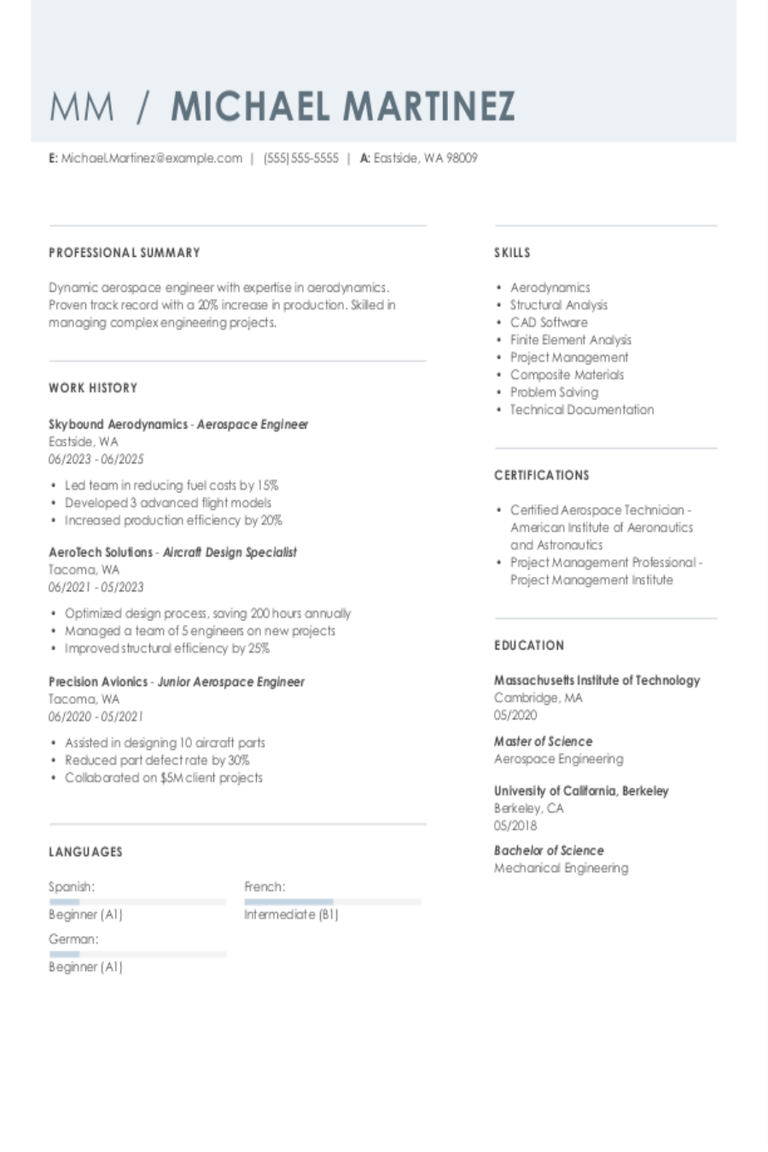
Aerospace Engineer Resume Examples & Templates
Explore aerospace engineer resume examples that show you how to highlight your experience designing aircraft, testing systems, and solving technical problems.Build my resumeImport existing resumeCustomize this templateWhy this resume
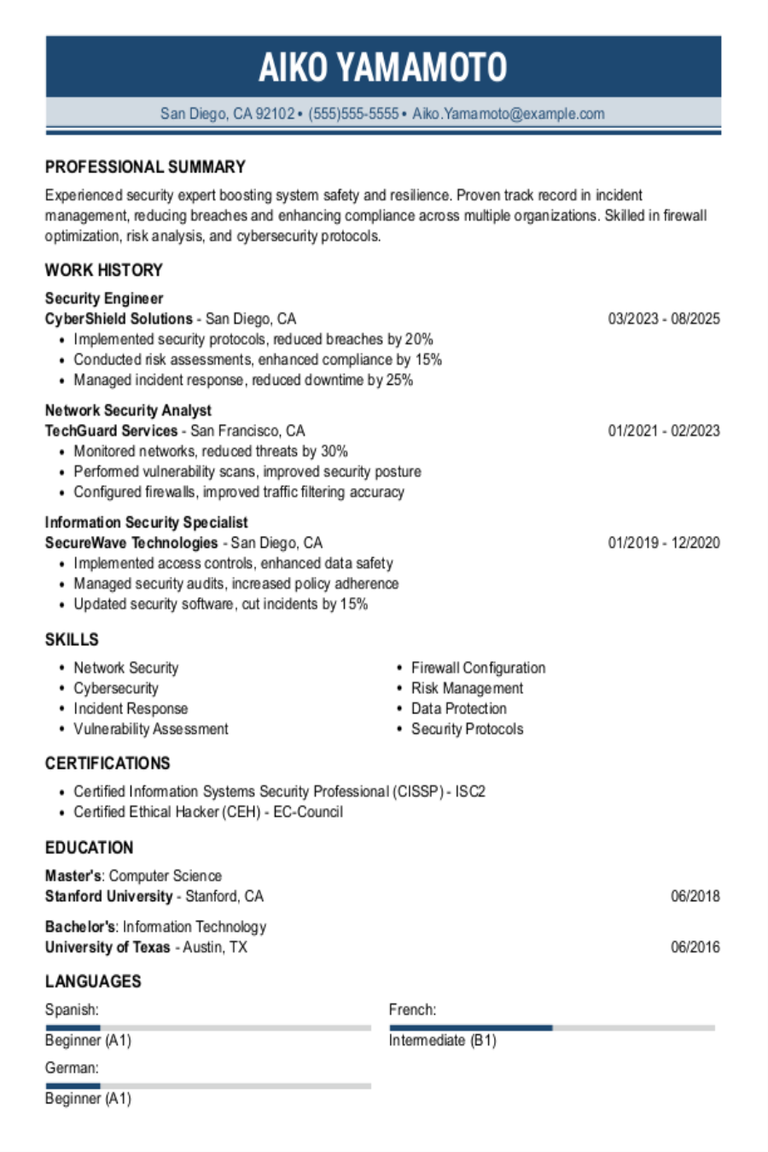
Security Engineer Resume Examples & Templates
Explore security engineer resume samples that highlight tech skills and experience in protecting data. Get tips to showcase your problem-solving abilities and cybersecurity expertise.Build my resumeImport existing resumeCustomize this templateWhy
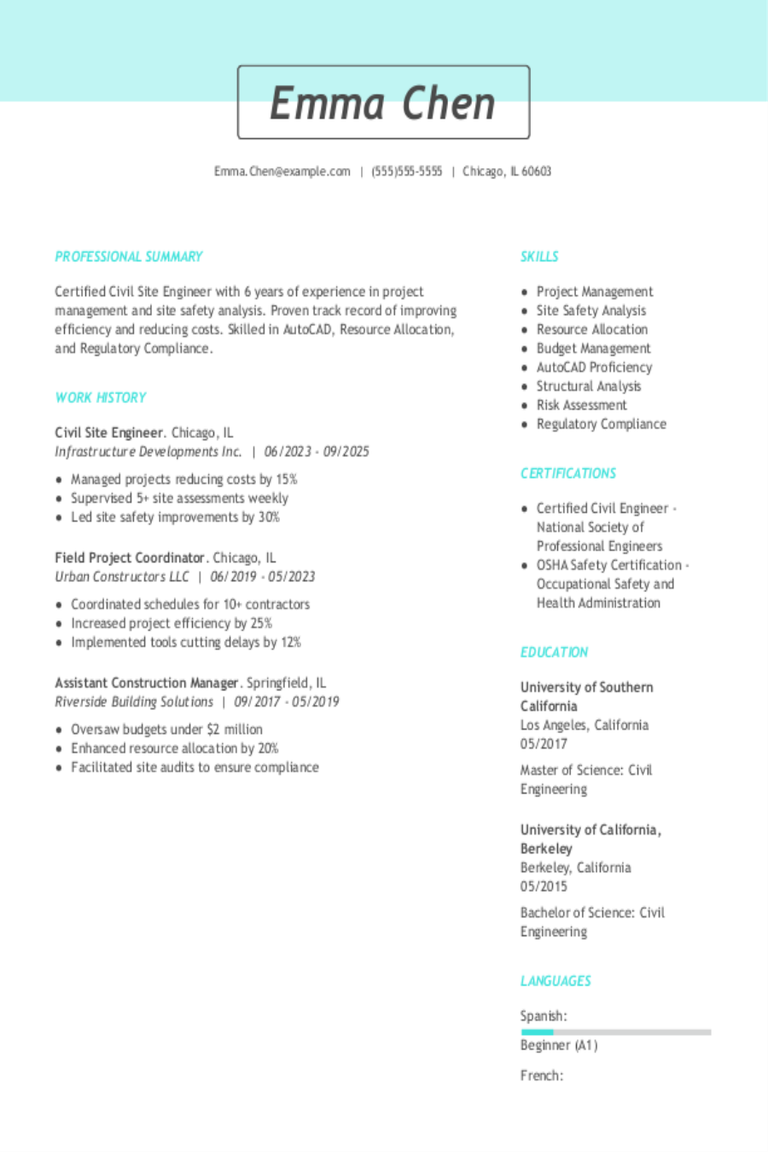
Civil Site Engineer Resume Examples & Templates
Browse civil site engineer resume examples to see how to highlight your experience planning projects, overseeing construction, and ensuring safety on site. These examples and tips help you highlight your
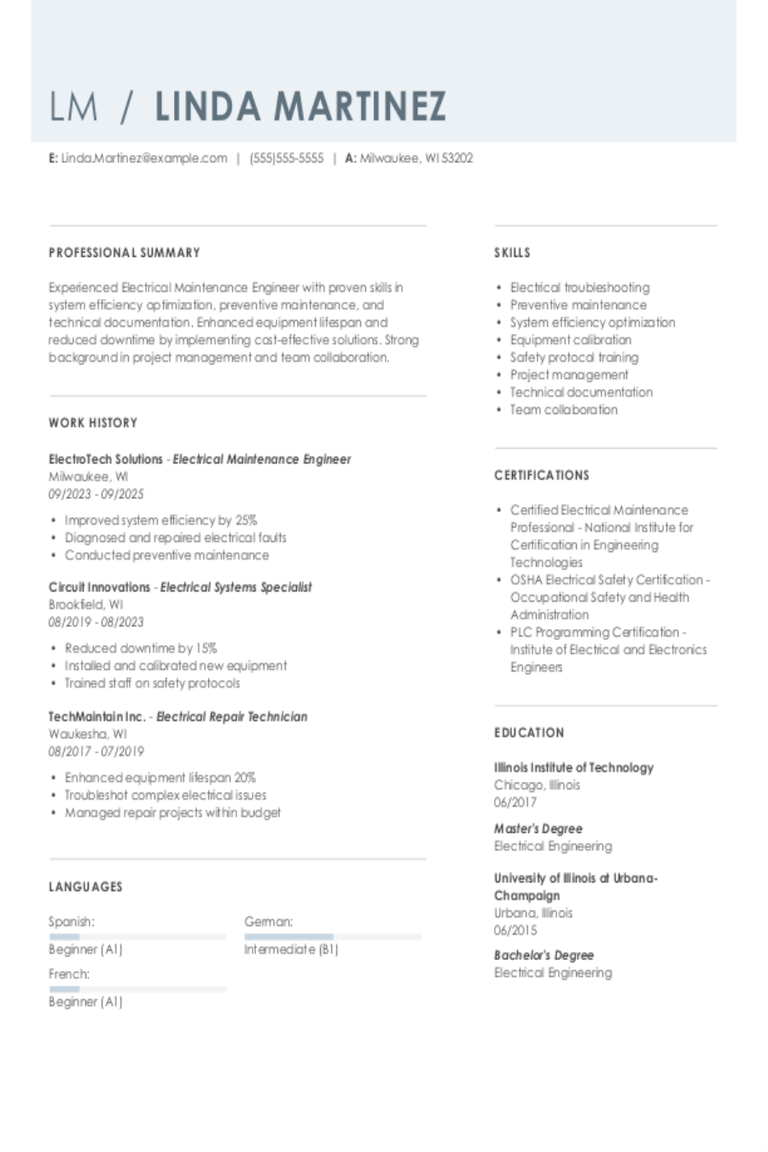
Electrical Maintenance Engineer Resume Examples & Templates
Explore electrical maintenance engineer examples and tips to learn how to effectively showcase your hands-on experience, teamwork, and problem-solving expertise.Build my resumeImport existing resumeCustomize this templateWhy this resume worksQuantifies accomplishments: By
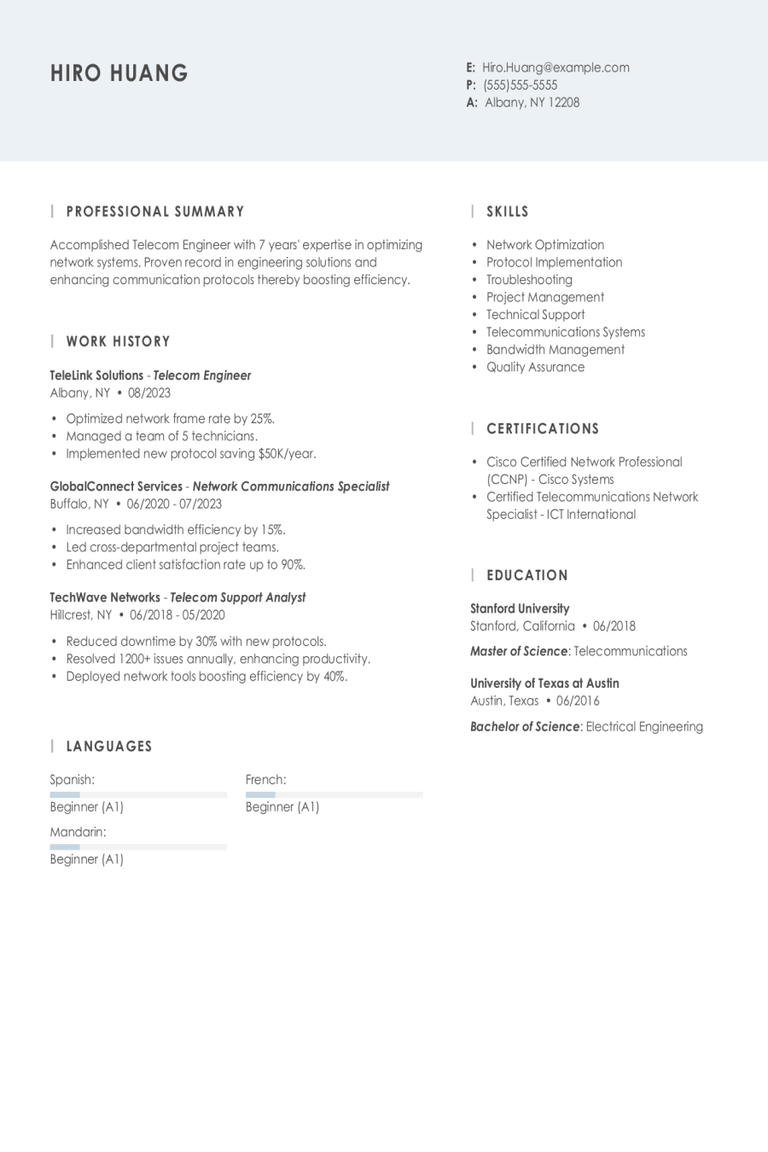
Telecom Engineer Resume Examples & Templates
Explore telecom engineer resume examples that highlight the technical know-how and problem-solving skills needed in the field. Get tips to showcase your experience with networks, systems, and communication technologies to
